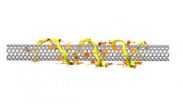(Press-News.org) U.S. production of ethanol for fuel has been rising quickly, topping 13 billion gallons in 2010. With the usual rail, truck and barge transport methods under potential strain, existing gas pipelines might be an efficient alternative for moving this renewable fuel around the country. But researchers at the National Institute of Standards and Technology (NIST) caution that ethanol, and especially the bacteria sometimes found in it, can dramatically degrade pipelines.
At a conference this week,* NIST researchers presented new experimental evidence that bacteria that feed on ethanol and produce acid boosted fatigue crack growth rates by at least 25 times the levels occuring in air alone.
The NIST team used a new biofuels test facility to evaluate fatigue-related cracking in two common pipeline steels immersed in ethanol mixtures, including simulated fuel-grade ethanol and an ethanol-water solution containing common bacteria, Acetobacter aceti. Ethanol and bacteria are known to cause corrosion, but this is the first study of their effects on fatigue cracking of pipeline steels.
"We have shown that ethanol fuel can increase the rate of fatigue crack growth in pipelines," NIST postdoctoral researcher Jeffrey Sowards says. "Substantial increases in crack growth rates were caused by the microbes. These are important data for pipeline engineers who want to safely and reliably transport ethanol fuel in repurposed oil and gas pipelines."
Ethanol, an alcohol that can be made from corn, is widely used as a gasoline additive due to its oxygen content and octane rating. Ethanol also can be used as fuel by itself in modified engines. The NIST tests focused on fuel-grade ethanol.
The tests were performed on X52 and X70 pipeline steels, which are alloys of more than a dozen metals. Simulated fuel-grade ethanol significantly increased crack growth at stress intensity levels found in typical pipeline operating conditions, but not at low stress levels. The cracking is related to corrosion. The X70 steel, which is finer-grained than X52, had lower rates of crack growth at all stress levels. This was expected because larger grain size generally reduces resistance to fatigue. In the bacteria-laden solutions, acid promoted crack growth at stress intensity levels found in typical pipeline operating conditions.
Preliminary tests also suggested that glutaraldehyde, a biocide used in oil and gas operations, may help control bacterial growth during ethanol transport.
The findings are the first from NIST's biofuels test facility, where material samples are installed in hydraulic test frames and subjected to load cycles while immersed in fuel inside a transparent polymer tank. Fatigue crack growth and other properties are observed over a period of up to 10 days. NIST staff expect to continue and possibly expand the research to other potential biofuels such as butanol or biodiesel.
Collaborators at the Colorado School of Mines provided the bacteria, which were isolated from industrial ethanol storage tanks. The research was supported by the U.S. Department of Transportation.
INFORMATION:
* J.W. Sowards, T.D. Weeks, J.D. McColskey, C. Williamson, L. Jain and J.R. Fekete. Effect of ethanol fuel and microbiologically influenced corrosion on the fatigue crack growth behavior of pipeline steels. Presented at DOD Corrosion Conference 2011, La Quinta, Calif., August 1, 2011.
NIST finds that ethanol-loving bacteria accelerate cracking of pipeline steels
2011-08-04
ELSE PRESS RELEASES FROM THIS DATE:
Novel coatings show great promise as flame retardants in polyurethane foam
2011-08-04
Gram for gram, novel carbon nanofiber-filled coatings devised by researchers from the National Institute of Standards and Technology (NIST) and Texas A&M University outperformed conventional flame retardants used in the polyurethane foam of upholstered furniture and mattresses by at least 160 percent and perhaps by as much as 1,130 percent.
The impressive test results, reported in the journal Polymer,* suggest that significant fire-safety advantages can be gained by coating polyurethane foam (PUF) with a club-sandwich-like arrangement of thin layers containing carbon ...
Armchair science: DNA strands that select nanotubes are first step to a practical 'quantum wire'
2011-08-04
DNA, a molecule famous for storing the genetic blueprints for all living things, can do other things as well. In a new paper,* researchers at the National Institute of Standards and Technology (NIST) describe how tailored single strands of DNA can be used to purify the highly desired "armchair" form of carbon nanotubes. Armchair-form single wall carbon nanotubes are needed to make "quantum wires" for low-loss, long distance electricity transmission and wiring.
Single-wall carbon nanotubes are usually about a nanometer in diameter, but they can be millions of nanometers ...
University of Miami business professor helps create a successful scheduling method for umpires in Major League Baseball
2011-08-04
Scheduling umpire crews in Major League Baseball (MLB) can be a daunting task. However, Tallys Yunes, assistant professor of management science at the University of Miami School of Business Administration and his collaborators have created a novel solution. The team developed an efficient method to generate high-quality schedules for the MLB.
The study is titled "Scheduling Major League Baseball Umpires and the Traveling Umpire Problem" published online ahead of print by the journal Interfaces, a popular outlet for practitioners in the field of Operations Research.
...
Research helps breeders really know their onions to enhance global food security
2011-08-04
Research led by the Warwick Crop Centre in the School of Life Sciences at the University of Warwick has developed a unique collection of information about the disease resistance of 96 of the world's onion varieties. It will be a crucial resource for commercial growers and seed producers trying to combat one of the most difficult diseases affecting onion crops. This work may also have benefits in terms of and reduced fertiliser consumption and enhanced drought tolerance.
The work on onions in this research funded by Defra (The Department for Environment, Food and Rural ...
Predicting perilous plaque in coronary arteries via fluid dynamics
2011-08-04
Researchers at Emory and Georgia Tech have developed a method for predicting which areas of the coronary arteries will develop more atherosclerotic plaque over time, based on intracoronary ultrasound and blood flow measurements.
The method could help doctors identify "vulnerable plaque," unstable plaque that is likely to cause a heart attack or stroke. It involves calculating shear stress, or how hard the blood tugs on the walls of the arteries, based on the geometry of the arteries and how fast the blood is moving.
The results were posted online this week in the journal ...
Aggressive drug therapy aids superbug evolution
2011-08-04
New research raises troubling concerns about the use of aggressive drug therapies to treat a wide range of diseases such as MRSA, C. difficile, malaria, and even cancer.
"The universally accepted strategy of aggressive medication to kill all targeted disease pathogens has the problematic consequence of giving any drug-resistant disease pathogens that are present the greatest possible evolutionary advantage," says Troy Day, one of the paper's co-authors and Canada Research Chair in Mathematical Biology at Queen's.
The researchers note that while the first aim of a drug ...
Finding could reduce antibiotic use in critically ill patients
2011-08-04
Measuring the levels of a natural body chemical may allow doctors to reduce the duration of antibiotic use and improve the health outcomes of critically ill patients.
"Infection is a common and expensive complication of critical illness and we're trying to find ways to improve the outcomes of sick, elderly patients and, at the same time, reduce health care costs," says Daren Heyland, a professor of Medicine at Queen's, director of the Clinical Evaluation Research Unit at Kingston General Hospital, and scientific director of the Technology Evaluation in the Elderly Network.
Prolonged ...
Harnessing the power of positive thoughts and emotions to treat depression
2011-08-04
New Rochelle, NY, August 3, 2011—Positive activity interventions (PAIs) offer a safe, low-cost, and self-administered approach to managing depression and may offer hope to individuals with depressive disorders who do not respond or have access to adequate medical therapy, according to a comprehensive review article in The Journal of Alternative and Complementary Medicine, a peer-reviewed journal published by Mary Ann Liebert, Inc. The article, "Delivering Happiness: Translating Positive Psychology Intervention Research for Treating Major and Minor Depressive Disorders" ...
Virginia Tech professors publish research on post-traumatic stress
2011-08-04
In the months after the April 16, 2007, shootings at Virginia Tech, two professors administered a survey to assess posttraumatic stress among students. The findings have been published in the July 18, 2011 issue of the Journal of Psychological Trauma: Theory, Research, Practice, and Policy, published by the American Psychological Association.
According to researchers Michael Hughes, professor of sociology in the College of Liberal Arts and Human Sciences, and Russell T. Jones, professor of psychology in the College of Science, 15.4 percent of Virginia Tech students experienced ...
Raptor usurpers in neighboring habitats reshape the conventional wisdom
2011-08-04
When we make plans that will change a natural environment — whether it's building a new shopping mall or planting a new forest — surveyors dutifully assess the environmental risks to plant and animal life in the region. But what's environmentally good for one area may be an environmental disaster for an adjacent one, a Tel Aviv University researcher cautions.
When displaced by these projects, indigenous species migrate to neighboring habitats, says Guilad Friedemann, a PhD student at TAU's Department of Zoology in the George S. Wise Faculty of Life Sciences. This has ...






